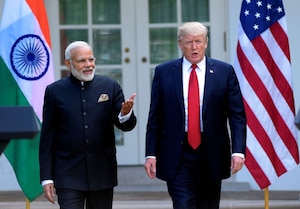Education Budget 2024 Lauded By Experts: Significant Boosts For Loans, Education & Skilling Initiatives Earn Praises
Experts praised the Union Budget 2024-25, highlighting the Rs 1.48 lakh crore allocation for education, loans, and skilling. Leaders see it as a major boost for youth empowerment and infrastructure.

In the Union Budget 2024-25, Finance Minister Nirmala Sitharaman announced a significant allocation of Rs 1.48 lakh crore for education, employment, and skilling. The budget focused on nine key areas: enhancing agricultural productivity and resilience, boosting employment and skills development, promoting inclusive human resource development and social justice, advancing manufacturing and services sectors, fostering urban development, ensuring energy security, improving infrastructure, encouraging innovation, research, and development, and implementing next-generation reforms.
In response to the Union Budget, several prominent education leaders praised the government for significant allocation, education loan and vision aimed at empowering 4.1 crore youth over five years
Fr. Sebastian George S.J, Director of XLRI Jamshedpur, praised the budget and said, "India's Union Budget 2024 exemplifies a transformative vision by making higher education more accessible with reduced loan interest rates, enhancing job opportunities for youths, and fostering women's participation in the workforce. This investment in education and skills will pave the way for a skilled, inclusive, and innovative future."
Dr. P. Venkat Rangan, Vice Chancellor of Amrita Vishwa Vidyapeetham, commended the government for allocating Rs 1.48 lakh crore, stating, “The Union Budget announced by the Hon’ble FM has its heart in the right place. The allocation of Rs 1.48 lakh crore to focus on education, employment, and skilling augurs well for nation-building in the long term. The increase in funding for central universities reflects a commendable commitment to strengthening the educational infrastructure. The financial support with loans up to Rs 10 lakhs for higher education is a significant step towards making education accessible to all."
"The skilling program to train 20 lakh young people over the next five years in partnership with state governments and industries is a welcome step too. The new internships, offering stipends and assistance funded through CSR, are also commendable and will provide the student’s valuable hands-on experience. We look forward to aligning with the nation's imperatives and working collaboratively with the government towards our common goals,” Dr Rangan said.
Prof. Ram Kumar Kakani, Director of IIM Raipur, highlighted the inclusive measures announced in the budget, saying, “To support our youth who haven't been eligible for any benefits under government schemes and policies, Finance Minister Nirmala Sitharaman announced several initiatives. For example, loans of up to Rs 10 lakh for higher education in the domestic sector, e-vouchers directly to 1 lakh students, and over the next five years, 500 top companies will provide internship opportunities with a monthly allowance of Rs 5,000, giving our young people valuable work experience."
"By integrating financial support for education, robust internship opportunities, and a strong focus on skill development, these measures not only empower our youth but also lay a solid foundation for sustainable growth and innovation. This holistic approach ensures that every segment of our society—from aspiring students to new startups—can contribute to and benefit from India's evolving economic landscape,” Prof. Kakani said.
Prof. Vidya Mahambare, Union Bank Chair Professor of Economics and Director at Great Lakes Institute of Management, Chennai, focused on the critical aspects of the budget while pointing out areas needing further attention.
Prof. Vidya Mahambare said, "The budget focuses on providing financial support for higher education through student loans and e-vouchers. There is a welcome emphasis on aligning skill development with industry requirements via upgrading industrial training institutes. This is crucial for addressing the skills gap and enhancing employability. While these initiatives are significant, the budget lacks specific measures addressing the supply side of the education sector, such as skill-upgradation of teachers and addressing the teacher shortage."
"Even in the era of online education, face-to-face instruction will continue to be the primary mode of education for most children. The budget also does not mention the progress made by the National Education Policy regarding its implementation via collaboration with the state governments. To transform India's education landscape, a more holistic approach with a balanced focus on demand and supply is necessary,” She added.
Dr. Sanjay Salunkhe, Founder and MD of Jaro Education, echoed the positive sentiments, adding, “As Finance Minister Nirmala Sitharaman unveils a budget with a vision aimed at empowering 4.1 crore youth over five years, including a substantial outlay of Rs 2 lakh crores, it's a resounding call to action. This year's provision of Rs 1.48 lakh crores for education, employment, and upskilling underscores our commitment to nurturing talent and unlocking potential."
"This initiative will also address the challenges youth face in pursuing necessary education and upskilling. At Jaro Education, we embrace this initiative as a catalyst for shaping a brighter, more inclusive future,” Dr Sanjay added.
Education Loan Information:
Calculate Education Loan EMI
Related Video
Delhi Election Results 2025: Counting Begins; BJP Poised for Historic Comeback in Delhi, Exit Polls Suggest | ABP News







































